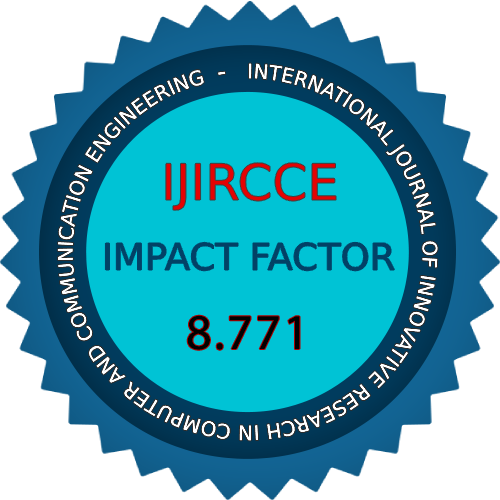International Journal of Innovative Research in Computer and Communication Engineering
ISSN Approved Journal | Impact factor: 8.771 | ESTD: 2013 | Follows UGC CARE Journal Norms and Guidelines
| Monthly, Peer-Reviewed, Refereed, Scholarly, Multidisciplinary and Open Access Journal | High Impact Factor 8.771 (Calculated by Google Scholar and Semantic Scholar | AI-Powered Research Tool | Indexing in all Major Database & Metadata, Citation Generator | Digital Object Identifier (DOI) |
PEER REVIEW
IJIRCCE follows a quick evaluation method in order to substantially reduce the time to publication. Submit the original article without any plagiarism with copyright material.
After initial evaluation, the manuscripts are sent to two reviewers which are determined by editor and / or editorial board. If necessary the number of reviewers can be increased by editor or editorial board. The reviewers are chosen from referee board according to their expertise. The submitted papers will be blind reviewed by two experts out of whom one expert will be an international expert. One positive report from the reviewers is necessary.
Reviewers are asked to evaluate the manuscript originality, methodology, and contribution to the literature, presentation of results and support for the conclusions and future work as well as appropriate referencing of previous relevant studies. Reviewers might accept the manuscript, reject the manuscript or might require a revision for style and / or content. Reviewers will return the review comments within 2 to 3 days after receiving the paper. The final decision for each submission will be made once the review report is received by Editor-in-Chief.
When a revision is required by the reviewer, the author(s) are to consider the criticism and suggestions offered by the reviewer and they should be sent back the revised version of manuscript within 5 days or requested time by the Editor. Revised manuscripts returned after one month will be considered as a new submissions and peer review process is started from the beginning. Reviewer may request more than one revision of a manuscript.
Why peer review is so important ?
It is difficult for authors and researchers, whether individually or in a team, to spot every mistake or flaw in a complicated piece of work. This is not necessarily a reflection on those concerned, but because with a new and perhaps eclectic subject, an opportunity for improvement may be more obvious to someone with special expertise or who simply looks at it with a fresh eye through different angle. Reviewing of the research of others can identify the possible weaknesses / flaw, thus quality would be improved. For both grant-funding and publication in a scholarly journal, it is also normally a requirement that the subject is both novel and substantial.
Reviewer will evaluate the article and gives the status to the Editor as follows:
If the Editor recommends “accepted without any modifications,” the manuscript is accepted for publication.
If the Editor recommends “accepted with minor modifications,” the authors are notified to prepare and submit a final copy of their manuscript with the required minor changes suggested by the reviewers. The Editor reviews the revised manuscript after the minor changes have been made by the authors. Once the Editor is satisfied with the final manuscript, the manuscript can be accepted.
If the Editor recommends “accepted with major modifications,” the recommendation is communicated to the authors. The authors are expected to revise their manuscripts in accordance with the changes recommended by the reviewers and to submit their revised manuscript in a timely manner. Once the revised manuscript is submitted, the Editor can then make an editorial recommendation which can be “Publish Unaltered,” “Consider after Minor Changes,” or “Reject.”
If the Editor recommends rejecting the manuscript, the rejection is immediate. Also, if two of the reviewers recommend rejecting the manuscript, the rejection is immediate.
The editorial workflow gives the Editors the authority to reject any manuscript because of inappropriateness of its subject, lack of quality, or incorrectness of its results. The Editor cannot assign himself/herself as an external reviewer of the manuscript. This is to ensure a high-quality, fair, and unbiased peer-review process of every manuscript submitted to the journal, since any manuscript must be recommended by one or more (usually two or more) external reviewers along with the Editor in charge of the manuscript in order for it to be accepted for publication in the journal.


